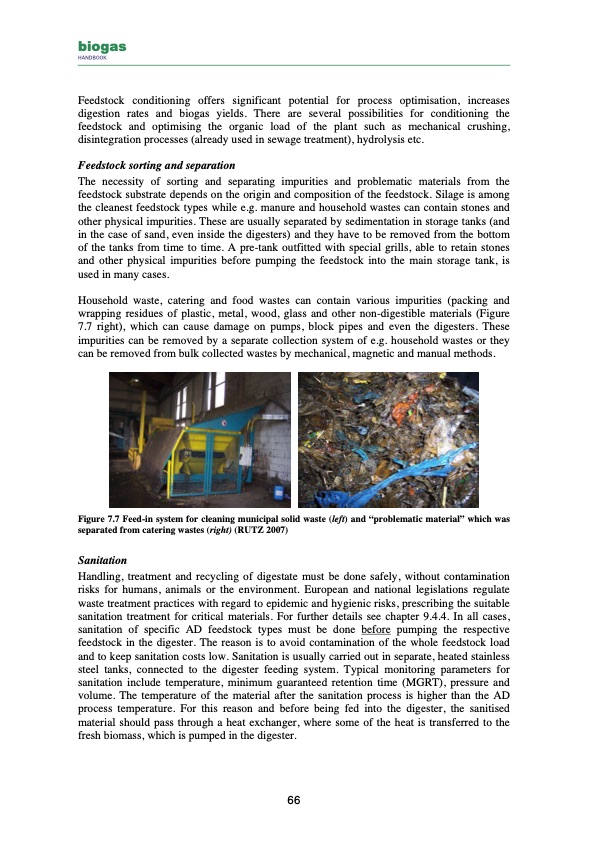
PDF Publication Title:
Text from PDF Page: 066
biogas HANDBOOK Feedstock conditioning offers significant potential for process optimisation, increases digestion rates and biogas yields. There are several possibilities for conditioning the feedstock and optimising the organic load of the plant such as mechanical crushing, disintegration processes (already used in sewage treatment), hydrolysis etc. Feedstock sorting and separation The necessity of sorting and separating impurities and problematic materials from the feedstock substrate depends on the origin and composition of the feedstock. Silage is among the cleanest feedstock types while e.g. manure and household wastes can contain stones and other physical impurities. These are usually separated by sedimentation in storage tanks (and in the case of sand, even inside the digesters) and they have to be removed from the bottom of the tanks from time to time. A pre-tank outfitted with special grills, able to retain stones and other physical impurities before pumping the feedstock into the main storage tank, is used in many cases. Household waste, catering and food wastes can contain various impurities (packing and wrapping residues of plastic, metal, wood, glass and other non-digestible materials (Figure 7.7 right), which can cause damage on pumps, block pipes and even the digesters. These impurities can be removed by a separate collection system of e.g. household wastes or they can be removed from bulk collected wastes by mechanical, magnetic and manual methods. Figure 7.7 Feed-in system for cleaning municipal solid waste (left) and “problematic material” which was separated from catering wastes (right) (RUTZ 2007) Sanitation Handling, treatment and recycling of digestate must be done safely, without contamination risks for humans, animals or the environment. European and national legislations regulate waste treatment practices with regard to epidemic and hygienic risks, prescribing the suitable sanitation treatment for critical materials. For further details see chapter 9.4.4. In all cases, sanitation of specific AD feedstock types must be done before pumping the respective feedstock in the digester. The reason is to avoid contamination of the whole feedstock load and to keep sanitation costs low. Sanitation is usually carried out in separate, heated stainless steel tanks, connected to the digester feeding system. Typical monitoring parameters for sanitation include temperature, minimum guaranteed retention time (MGRT), pressure and volume. The temperature of the material after the sanitation process is higher than the AD process temperature. For this reason and before being fed into the digester, the sanitised material should pass through a heat exchanger, where some of the heat is transferred to the fresh biomass, which is pumped in the digester. 66PDF Image | biogas HANDBOOK

PDF Search Title:
biogas HANDBOOKOriginal File Name Searched:
BiogasHandbook.pdfDIY PDF Search: Google It | Yahoo | Bing
Capstone Turbine and Microturbine: Capstone microturbines used and new surplus for sale listing More Info
Consulting and Strategy Services: Need help with Capstone Turbine, sizing systems, applications, or renewable energy strategy, we are here to assist More Info
Container Lumber Dry Kiln: Since 1991 developing and innovating dry kilns using standard shipping containers More Info
Supercritical CO2 Lumber Dry Kiln: Compact fast drying in 3 days or less for small amounts of wood and lumber drying More Info
BitCoin Mining: Bitcoin Mining and Cryptocurrency... More Info
Publications: Capstone Turbine publications for microturbine and distributed energy More Info
FileMaker Software for Renewable Energy Developing database software for the renewable energy industry More Info
CO2 Gas to Liquids On-Demand Production Cart Developing a supercritical CO2 to alcohol on-demand production system (via Nafion reverse fuel cell) More Info
Stranded Gas for low cost power Bitcoin Mining Using stranded gas for generators may provide breakthrough low power costs for cryptocurrency miners. More Info
| CONTACT TEL: 608-238-6001 Email: greg@globalmicroturbine.com | RSS | AMP |